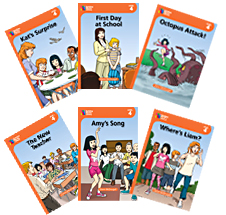 From level 4 upwards, the brief was that the stories had to be about the same group of kids and become increasingly character-driven, rather than plot-driven, as the levels progressed. From level 4 upwards, the brief was that the stories had to be about the same group of kids and become increasingly character-driven, rather than plot-driven, as the levels progressed.
These kids had to grow and develop physically, emotionally and socially. Their stories had to be relevant to their peers in Japan, and other Asian countries, but also be international. There had to be some linkages and common threads between stories to tie the series together.
So, after writing the first three levels, developing the characters and their backgrounds and environment, the major task of getting BBL underway was done.
The majority of the credit for this arduous process must go to my editor, Judy McDonald. Judy is a legend in the ELT book development and editing field, and she really knows what she’s doing .
Contrary to what many eager would-be series authors may think, the actual writing does not start for a number of months.
First comes what people in the trade call a scope and sequence. I shiver at the mention of these three words.
The scope and sequence is a vast document (usually an Excel spreadsheet) co-developed by the writer/s and editor/s and other stakeholders, which contains a detailed map of the whole project.
For example, it will say how many books there are; the working titles of the books; the sequence the books will appear in; how many pages per book; how many books per level; the grammar level; the headwords and key language for each level; a detailed treatment of the plot for each book; and, of course, which characters appear in which story.
It’s a lot of work. After a few wines, editors like to say, “the scope and sequence is the hard part. After that, the writing is easy. Piece of cake.”
Sure. Maybe easier, but not easy, never easy! If it’s easy, why not give it to a monkey to finish next time ?
Because if that were really true, there would be no editors - everyone would rather be writers, as editing is extremely hard work. And if there were no editors, there would be no books, and if there were no books, there would be no need for writers.
So if you love reading, go and hug an editor today.
It’s a difficult and mostly thankless job. You don’t see footage of the editor of the Harry Potter books on TV, frolicking about in some exclusive Caribbean resort, do you?
This scope and sequence is bounced back and forward between all the key stakeholders and is changed, and changed, and changed, until it is coherent and consistent, and everyone is happy with it.
Right. The scope and sequence is done, finally, time to write.
Whoa! Not so fast eager not-so-young author, says the editor sternly.
Eh?
We need to work on the characters first. |